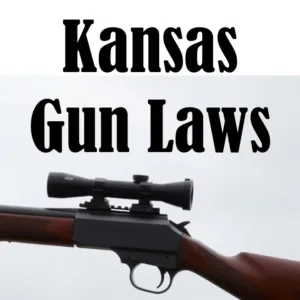Kansas has permissive gun laws, including permitless carry, minimal purchasing requirements, and broad self-defense rights. This guide covers the key aspects of Kansas firearm regulations, including purchasing, open and concealed carry, restricted areas, and self-defense laws.
Kansas Gun Laws Overview

Purchasing Firearms in Kansas
Kansas has no state-specific requirements for purchasing firearms beyond federal guidelines, making the process straightforward for most residents.
Key Requirements:
- Permit to Purchase: No permit is required to purchase long guns or handguns.
- Background Check: Required only for purchases from licensed dealers, per federal law. Private sales do not require background checks.
- Waiting Period: Kansas does not mandate a waiting period for purchasing firearms.
- Minimum Age: Federal law sets the minimum age at 18 for long guns and 21 for handguns.
Open Carry in Kansas
Kansas allows open carry of firearms without a permit, giving residents the freedom to carry firearms openly in most public areas. However, some restrictions apply to specific locations.
Key Points on Open Carry:
- Permitless Open Carry: Individuals 18 and older can openly carry firearms without a permit.
- Restricted Areas: Open carry is not allowed in certain locations, including schools, courthouses, and other government facilities.
- Vehicle Carry: Kansas residents can openly carry firearms in their vehicles without a permit.
Concealed Carry in Kansas
Kansas is a constitutional carry state, which means that individuals can carry concealed firearms without a permit if they meet legal requirements. Kansas also issues concealed carry permits for residents who want the flexibility of carrying in states with reciprocity agreements.
How to Obtain a Concealed Carry Permit (CCL):
- Eligibility Requirements: Must be at least 21 years old, be legally allowed to possess firearms, and meet background check criteria.
- Training: While not required for constitutional carry, those applying for a CCL must complete a certified firearms safety course.
- Application Process: Submit the application, along with fingerprints and background check information, to the local sheriff’s office.
- Renewal: Concealed carry licenses must be renewed every four years.
Reciprocity with Other States
Kansas recognizes all valid concealed carry permits from other states, allowing non-residents with permits to carry in Kansas. Kansas permits are recognized in several other states, but permit holders should verify state-specific laws when traveling.
Restricted Locations for Carrying Firearms in Kansas
While Kansas generally allows open and concealed carry, there are certain areas where firearms are restricted, even for permit holders.
- Schools and University Campuses: Firearms are prohibited in K-12 schools and certain areas of university campuses, though concealed carry may be allowed in some circumstances.
- Government Buildings: Firearms are restricted in courthouses, police stations, and other government facilities.
- Private Property: Property owners can prohibit firearms on their premises, and signs indicating such must be adhered to.
- Bars and Alcohol-Serving Establishments: Kansas law prohibits concealed carry in establishments where more than 50% of revenue is from alcohol, although some exceptions may apply.
Self-Defense Laws in Kansas: Stand Your Ground
Kansas has a Stand Your Ground law and a Castle Doctrine, allowing individuals to use force in self-defense without the duty to retreat in certain situations.
Stand Your Ground
Kansas law permits individuals to use force, including deadly force if necessary, to defend themselves or others against an imminent threat in any location where they have a legal right to be.
Castle Doctrine
The Castle Doctrine in Kansas extends self-defense rights to one’s home, vehicle, or place of business. Homeowners are allowed to use force, including deadly force, against unlawful intruders posing an immediate threat to personal safety.
Firearms Prohibited Persons in Kansas
Kansas restricts firearm ownership for individuals who meet certain federal prohibitions, with additional state-imposed restrictions.
- Felony Convictions: Individuals convicted of felonies are prohibited from firearm possession.
- Domestic Violence Convictions: Those convicted of domestic violence misdemeanors may not possess firearms.
- Mental Health Restrictions: Persons who have been involuntarily committed for mental health treatment may be prohibited from owning firearms.
- Protective Orders: Those with active restraining orders related to domestic violence may be restricted from firearm possession.
Assault Weapon and Magazine Capacity Regulations
Kansas does not impose additional restrictions on assault weapons or magazine capacity. This means residents are generally permitted to own a wide range of firearms and magazines without state limitations.
Penalties for Violating Gun Laws in Kansas
Kansas enforces penalties for violations of firearm laws, including fines, imprisonment, and the loss of firearm rights. Common violations include:
- Unlawful Possession: Possessing a firearm as a prohibited person can result in significant legal consequences.
- Carrying in Restricted Areas: Violations, such as carrying a firearm in prohibited locations, can lead to fines or criminal charges.
- Failure to Follow Private Property Rules: Failure to respect “no firearms” signage on private property may result in removal from the premises or other penalties.
Conclusion: Understanding Kansas’ Gun Laws
Kansas is a gun-friendly state, allowing permitless carry and minimal purchasing restrictions. However, there are still some restricted areas for carrying firearms, and residents must adhere to state and federal guidelines for responsible ownership. For Kansas residents, constitutional carry offers flexibility, while concealed carry permits provide broader reciprocity in other states.
FAQs About Gun Laws in Kansas
1. Do I need a permit to buy a gun in Kansas?
No, Kansas does not require a permit to purchase firearms.
2. Does Kansas allow open carry without a permit?
Yes, open carry is allowed without a permit for individuals 18 and older.
3. Does Kansas recognize out-of-state concealed carry permits?
Yes, Kansas honors all out-of-state concealed carry permits.
4. Are there restrictions on magazine capacity in Kansas?
No, Kansas does not impose magazine capacity limits.
5. What self-defense laws apply in Kansas?
Kansas has Stand Your Ground and Castle Doctrine laws, permitting individuals to defend themselves without a duty to retreat in certain situations.
